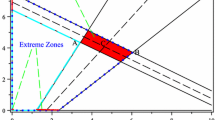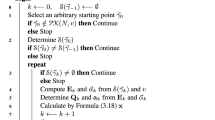Abstract
In this paper, we concentrate on solving the zero-sum two-person continuous differential games using rough programming approach. A new class defined as rough continuous differential games is resulted from the combination of rough programming and continuous differential games. An effective and simple technique is given for solving such problem. In addition, the trust measure and the expected value operator of rough interval are used to find the \( \upalpha \)-trust and expected equilibrium strategies for the rough zero-sum two-person continuous differential games. Moreover, sufficient and necessary conditions for an open loop saddle point solution of rough continuous differential games are also derived. Finally, a numerical example is given to confirm the theoretical results.
Similar content being viewed by others
References
Von Neumann, J., Morgenstern, D.: The Theory of Games in Economic Bahavior. Wiley, New York (1944)
Hung, I.C., Hsia, K.H., Chen, L.W.: Fuzzy differential game of guarding a movable territory. Inf. Sci. 91, 113–131 (1996)
Harsanyi, J.C.: Games with incomplete information played by ‘Bayesian’ players. I: the basic model. Manag. Sci. 14, 159–182 (1967)
Xu, J.: Zero sum two-person game with grey number payoff matrix in linear programming. J. Grey Syst. 10(3), 225–233 (1998)
Dhingra, A.K., Rao, S.S.: A cooperative fuzzy game theoretic approach to multiple objective design optimization. Eur. J. Oper. Res. 83, 547–567 (1995)
Takahashi, S.: The number of pure Nash equilibria in a random game with nondecreasing best responses. Games Econ. Behav. 63(1), 328–340 (2008)
Espin, R., Fernandez, E., Mazcorro, G., Ines, M.: A fuzzy approach to cooperative n-person games. Eur. J. Oper. Res. 176(3), 1735–1751 (2007)
Pawlak, Z.: Rough sets. Int. J. Comput. Inf. Sci. 11(5), 341–356 (1982)
Pawlak, Z., Skowron, A.: Rudiment of rough sets. Inf. Sci. (NY) 177(1), 3–27 (2007)
Nasiri, J.H., Mashinchi, M.: Rough set and data analysis in decision tables. J. Uncertain Syst. 3(3), 232–240 (2009)
Weigou, Y., Mingyu, L., Zhi, L.: Variable precision rough set based decision tree classifier. J. Intell. Fuzzy Syst. 23(2), 61–70 (2012)
Arabani, M., Nashaei, M.A.L.: Application of rough set theory as a new approach to simplify dams location. Sci. Iran. 13(2), 152–158 (2006)
Rebolledo, M.: Rough intervals enhancing intervals for qualitative modeling of technical systems. Artif. Intell. 170(8), 667–685 (2006)
Liu, B.: Theory and Practice of Uncertain Programming. Physica, Heidelberg (2002)
Isaacs, R.: Differential Games: A Mathematical Theory with Application to Warfare and Pursuit, Control and Optimization. Wiley, New York (1965)
Megahed, A.A., Hegazy, S.: Min–max zero sum two persons continuous differential game with fuzzy controls. Asian J. Curr. Eng. Maths 2(2), 86–98 (2013)
Megahed, A.A., Hegazy, S.: Min–max zero sum two persons fuzzy continuous differential game. Int. J. Appl. Math. 21(1), 1–16 (2008)
Campos, L.: Fuzzy linear programming model to solve fuzzy matrix game. Fuzzy Sets Syst. 32, 275–289 (1989)
Roy, S.K., Mula, P.: Solving matrix game with rough payoffs using genetic algorithm. Oper. Res. Int. J. 16(1), 117–130 (2016)
Roy, S.K., Mondal, S.N.: An approach to solve fuzzy interval valued matrix game. Int. J. Oper. Res. 26(3), 253–267 (2016)
Mula, P., Roy, S.K., Li, D.: Birough programming approach for solving bi-matrix games with birough payoff elements. J. Intell. Fuzzy Syst. 29, 863–875 (2015)
Das, C.B., Roy, S.K.: Fuzzy based GA for entropy bimatrix goal game. Int. J. Uncertain Fuzziness Knowl. Based Syst. 18(6), 779–799 (2010)
Das, C.B., Roy, S.K.: Fuzzy based GA to multi-objective entropy bimatrix game. Int. J. Oper. Res. 50(1), 125–140 (2013)
Roy, S.K., Mula, P.: Rough set approach to bi-matrix game. Int. J. Oper. Res. 23(2), 1 (2015)
Bhaumik, A., Roy, S.K., Li, D.-F.: Analysis of triangular intuitionistic fuzzy matrix games using robust ranking. J. Intell. Fuzzy Syst. 33(1), 327–336 (2017)
Xiao, S., Lai, E.M.K.: Rough programming approach to power-balanced instruction scheduling for VLIW digital signal processors. IEEE Trans. Signal Process. 56(4), 1698–1709 (2008)
Fleming, W.H., Rishel, R.W.: Deterministic and Stochastic Optimal Control. Springer, Berlin (1975)
Yang, X., Gao, J.: Uncertain differential games with application to capitalism. J. Uncertain. Anal. Appl. 1, 1–17 (2013)
Acknowledgements
The authors would like to thank the editor and the anonymous reviewers for their helpful comments for revising the article.
Author information
Authors and Affiliations
Corresponding author
Additional information
Publisher's Note
Springer Nature remains neutral with regard to jurisdictional claims in published maps and institutional affiliations.
Rights and permissions
About this article
Cite this article
Ammar, ES., Brikaa, M.G. & Abdel-Rehim, E. A study on two-person zero-sum rough interval continuous differential games. OPSEARCH 56, 689–716 (2019). https://doi.org/10.1007/s12597-019-00383-2
Accepted:
Published:
Issue Date:
DOI: https://doi.org/10.1007/s12597-019-00383-2




